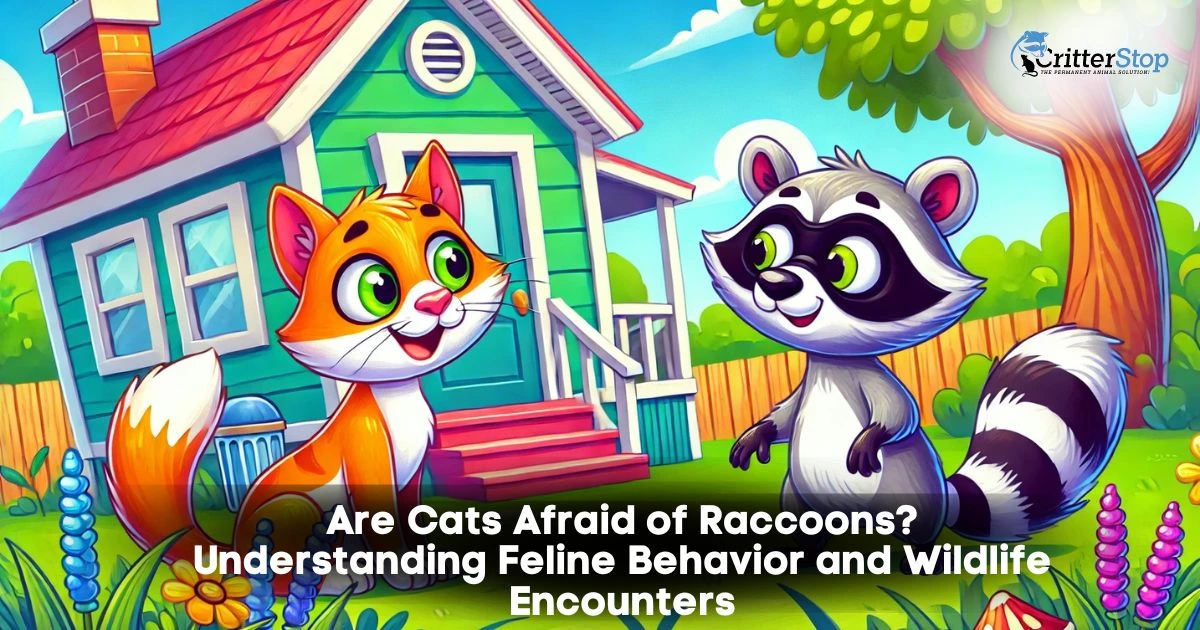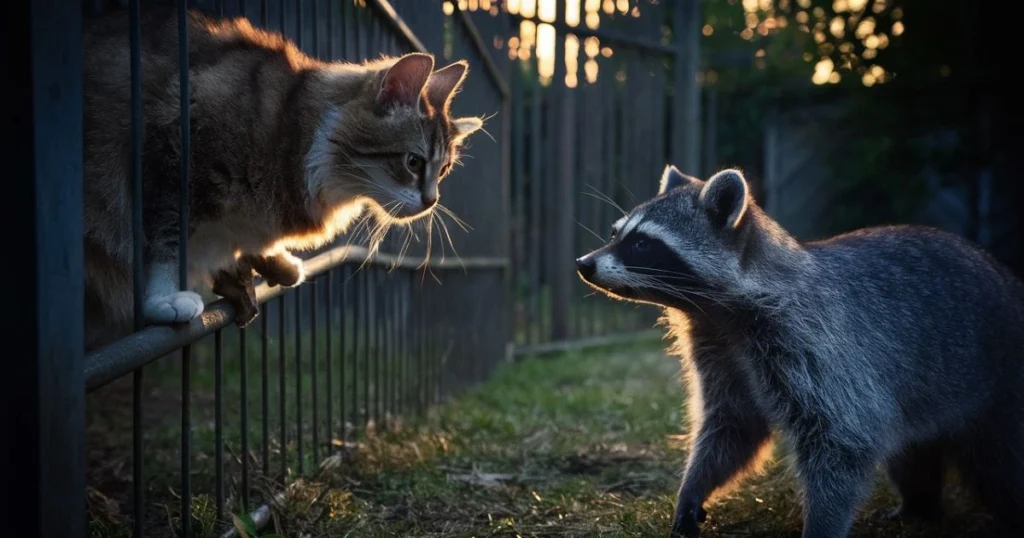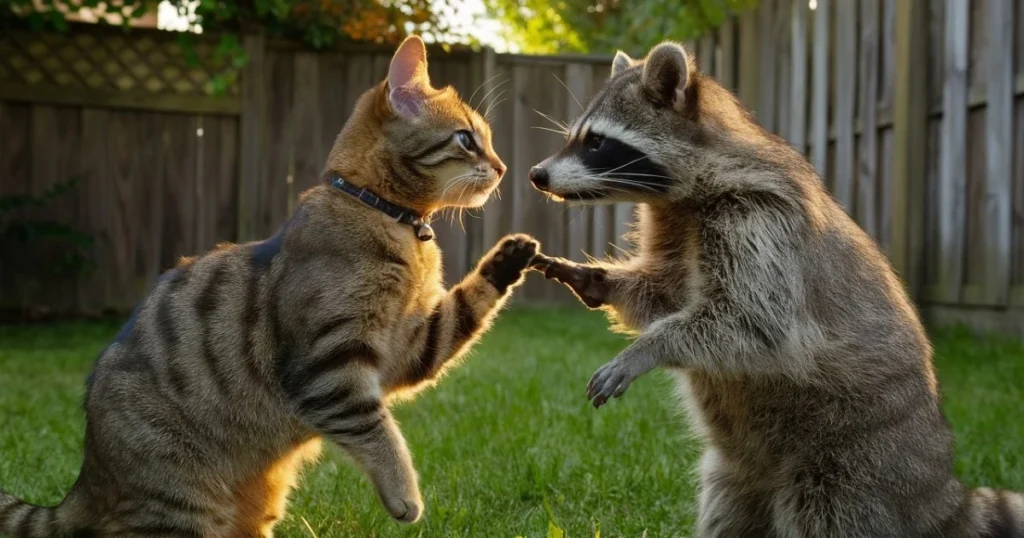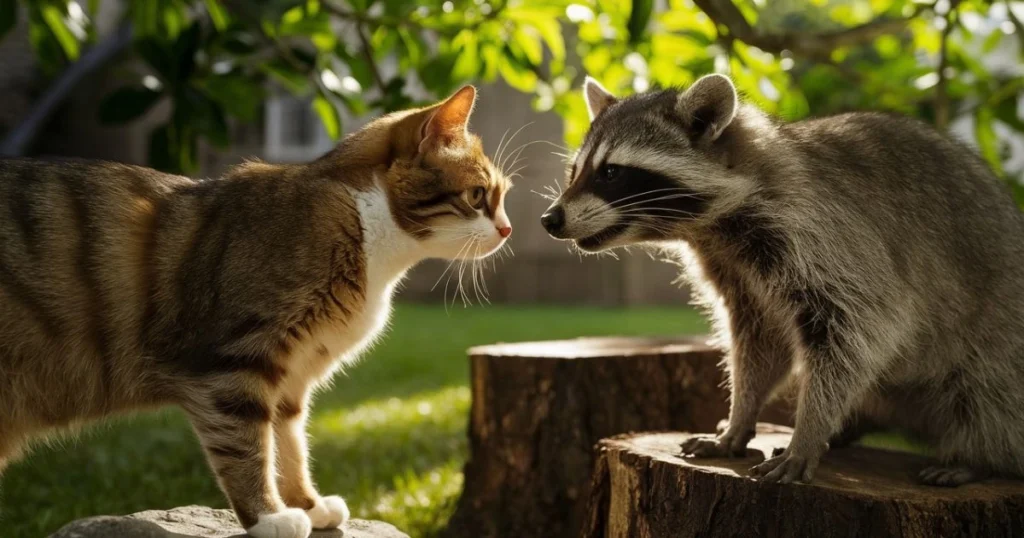
As pet owners, we often wonder how our beloved cats react to encounters with wild animals, especially in areas where these interactions are more likely. One of the most common concerns revolves around the question: Are cats afraid of raccoons?
This is a legitimate worry, especially given these two animals' size, temperament, and behavior differences. In this comprehensive guide, we’ll explore whether cats fear raccoons, how these interactions unfold, and how to protect your cat in areas where raccoons are prevalent.
Before diving into whether cats fear raccoons, it's important to understand feline behavior in general. Cats are naturally curious creatures, but they also exhibit a strong territorial instinct.
They rely on their keen senses and quick reflexes to assess environmental threats. When encountering an unfamiliar animal, their reactions are typically driven by their assessment of whether that animal poses a danger.
Cats tend to be cautious and are more likely to avoid a confrontation unless they feel threatened or cornered. While they are known to be fearless hunters, their approach to larger animals like raccoons is more reserved, as they instinctively understand that a raccoon might present a challenge.

Raccoons are highly intelligent and resourceful animals. Known for their dexterity and problem-solving abilities, raccoons are omnivores that thrive in urban, suburban, and rural environments. They are often seen rummaging through trash cans, searching for food in backyards, or even entering homes through pet doors for an easy meal.
Raccoons are generally unafraid of domesticated animals, and their boldness can sometimes lead to conflicts with household pets. Regarding cats, raccoons may not be as timid as one would hope. They are larger, weighing 10 to 30 pounds, and equipped with sharp teeth and claws, making them formidable opponents if provoked.
However, raccoons are typically not aggressive unless they feel threatened or are protecting their young. Most raccoon-cat encounters will likely result in the raccoon ignoring or avoiding the cat unless food is involved. Competition can escalate in the presence of food, potentially leading to a confrontation between the two.
So, are cats afraid of raccoons? The answer depends on the cat’s temperament and previous experiences with wildlife. Some cats may be wary of raccoons due to their size and unpredictable behavior, while others might not show any fear at all. Here are some factors that influence a cat’s reaction to raccoons:

Although raccoons are not naturally inclined to attack cats, there are certain scenarios in which aggression may occur. Raccoons are opportunistic feeders and may view cats as competition for food, especially if a food source like a pet’s bowl or garbage can is present. A raccoon may lash out at a cat in self-defense if it feels cornered or threatened.
That said, it’s important to note that most raccoon-cat encounters do not result in violence. Raccoons are likelier to avoid cats if they don’t feel directly threatened. However, cats that attempt to engage with or chase raccoons may put themselves at risk of injury.
If you live where raccoons are common, protecting your cat is essential. Here are several practical measures to keep your pet safe:
To prevent any potential encounters between your cat and raccoons, it’s crucial to recognize the signs of raccoon activity on your property. Some indicators include:

In conclusion, the answer to the question, "Are cats afraid of raccoons?", varies based on the individual cat’s personality and previous experiences. While many cats may exhibit caution or fear when encountering a raccoon, others may be more territorial and bold in their approach. However, due to the size and unpredictability of raccoons, it’s always best to take precautions to ensure your cat’s safety.
If raccoons are frequent visitors to your property and you're concerned about the safety of your pets, it may be time to contact a professional wildlife removal service to address the issue. Critter Stop, a humane wildlife removal company, specializes in safely and effectively handling raccoon problems and other pest intrusions. Securing your property and being mindful of your cat's outdoor activities can minimize the chances of dangerous encounters between your pet and local wildlife.
For peace of mind and expert help, call Critter Stop at (214) 234-2616 for a free inspection. Critter Stop has earned a fantastic reputation and receives excellent customer reviews online due to its commitment to high-quality work and exceptional customer service. Whether dealing with raccoons or other wildlife, Critter Stop is your trusted partner in protecting your home and pets.
This FAQ section addresses common questions about the behavior and interactions between cats and raccoons. Whether you're curious about whether these two animals get along, how to protect your pets, or if there are any risks involved when they share a territory, you'll find detailed answers to guide you in keeping your pets safe.
Some cats are afraid of raccoons, especially when they first encounter them. Cats tend to be cautious around larger animals, and raccoons, being opportunistic and bold, may seem intimidating to a cat. However, not all cats react with fear—some may stand their ground or avoid raccoons entirely, depending on their temperament and past experiences.
In some cases, cats fight raccoons if they feel threatened or cornered. However, most cats prefer to avoid conflict and will flee or hiss to scare the raccoon away. If a fight does occur, it could be dangerous for the cat, as raccoons are larger and have sharp claws and teeth.
No, cats and raccoons cannot have babies together. While both species are mammals, they are genetically too different to reproduce. Cats belong to the Felidae family, while raccoons belong to the Procyonidae family, making interbreeding biologically impossible.
Raccoons are opportunistic feeders and may scavenge on carrion, but it's rare for raccoons to eat dead cats. Raccoons typically feed on fruits, vegetables, small animals, and garbage. It's not common while they may eat roadkill or other dead animals, including cats.
To feed stray cats but not raccoons, try to feed the cats during the day, as raccoons are nocturnal. Bring food indoors once the cats have eaten to avoid attracting raccoons. You can also use feeding stations with doors open only for cats based on size or microchip.
Cats are unlikely to kill raccoons due to the size difference and the fact that raccoons are generally more powerful than cats. While some cats may act aggressively towards raccoons, they typically avoid engaging in physical fights that could result in serious injury to either party.
No, raccoons and cats cannot have babies together. They are entirely different species, with different numbers of chromosomes and biological traits that make interbreeding impossible. Despite sometimes interacting, raccoons and cats are not capable of producing offspring.
Yes, in short bursts, cats are faster than raccoons. Cats are known for their agility and can run up to 30 miles per hour, while raccoons are much slower, generally reaching speeds of about 15 miles per hour. However, raccoons are more skilled climbers, which can help them escape dangerous situations.
Typically, raccoons are bigger than cats. An adult raccoon can weigh between 10 to 30 pounds, while most domestic cats weigh between 8 to 15 pounds. Additionally, raccoons appear bulkier due to their thick fur and body structure.
In some cases, raccoons and cats can get along, especially if they are used to coexisting in the same environment. However, their interactions can vary. Some cats and raccoons may ignore each other, while others may display territorial behavior or aggression. It’s best to supervise any interactions to prevent conflicts.
Cats typically do not attack raccoons unless they feel threatened or are protecting their territory. Most cats will try to avoid a confrontation with a raccoon. If a cat does attack, it is more likely to hiss, swat, or chase the raccoon without fully engaging in a fight.
Raccoons generally do not go after cats, but they may become aggressive if they feel threatened or if there’s competition over food. Raccoons are scavengers and may try to steal food from a cat’s bowl, but direct attacks on cats are rare.
Yes, raccoons can attack cats if provoked or if they feel their territory or food source is being threatened. While raccoons usually avoid direct conflict, they will defend themselves if a cat challenges them. It’s best to keep food sources out of reach and monitor your pets when raccoons are nearby.
In most cases, raccoons do not bother cats, preferring to focus on finding food and avoiding unnecessary confrontations. However, conflicts can arise if both animals are competing for food. Securing pet food and preventing raccoons from becoming too comfortable around your home is important.
Raccoons are not typically mean to cats but may act aggressively if they feel threatened. Most raccoons and cats interact peacefully, with each animal avoiding the other. However, if a raccoon perceives a threat, it may become defensive.
Raccoons do not often attack cats, but they can do so under specific circumstances, such as when food is involved or if the raccoon feels cornered. It's important to watch your cat, especially in areas where raccoons are known to roam, to avoid potential conflicts.
Visit our Critter Library and learn more about our furry friends







